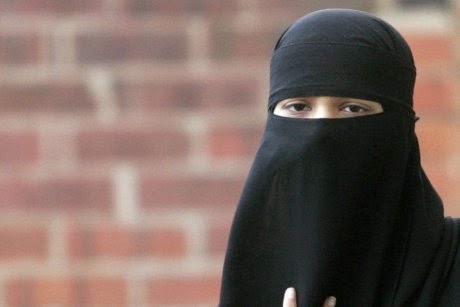It has been called a security risk and a "flag of fundamentalism" ,
there have been calls to ban it and it has been associated with
terrorism.
So what exactly is the burka? And why do some Muslim women
wear it?
Raihan Ismail is a lecturer at in Middle East Politics and Islamic
Studies at the Australian National University.
Dr Ismail spoke with 666 ABC Canberra to answer some common
questions about the burka.
Why do some Muslim women wear burkas?
The Koran calls for both men and women to 'cover and be modest'.
#NotInMyName
Is it a burka, niqab or hijab?
The use of the term burka in Australia is often confused with what is
actually the niqab.
The burka covers the entire body including the whole face, with a
mesh window for the woman to see out of.
The niqab covers the whole body including the face with the
exception of the woman's eyes.
"The niqab is more accurate; people rarely wear the burka in
Australia," Dr Ismail said.
"In Australia people mostly wear the hijab in lots of different styles."
The hijab covers the hair and chest and is common among Muslim
women in South East Asia.
Hijab is also a general term referring to the practice of wearing
veils of all kinds.
Are some Muslim women forced to wear a burka or
niqab?
In Australia Dr Ismail said that the reasons women wear veils of all
kinds vary widely and take in influences from culture, fashion as
well as religion.
"Some women wear it because they strongly believe it is their
religious obligation," she said.
Dr Ismail does concede that some women may be pressured in to
covering themselves.
"There is a possibility that some husbands would tell their wives
'please wear the niqab, I don't want any other men to see you'
which is possessive," she said.
"When it comes to that, the problem is not the niqab, it is being
married to someone who is possessive and oppressive."
Should the burka be banned?
Dr Ismail does not agree that banning the burka in Australia would
solve the problem of oppression.
"By banning the burka or niqab you are preventing some women
in freely practising what they believe in," she said.
"You would probably isolate these women because they would not be
able to go out."
Muslim women do not wear a veil in front of their immediate family,
which usually means a niqab or hijab is not worn at home.
What is your personal experience of wearing the
hijab?
As a Muslim woman who wears the hijab, Dr Ismail has had some
negative experience in Canberra.
"Once in a while, people call me a terrorist," she said.
"My first experience in Australia [involved] two women behind me
who said 'they are everywhere, it's like a disease'.
"They pushed me a little bit and started laughing; I was so
heartbroken."
Though confronting and upsetting, Dr Ismail said this kind of
experience is in the minority.
"In Canberra people are so lovely, sometimes people just smile at
me, and that is just so nice," she said.


No comments:
Post a Comment